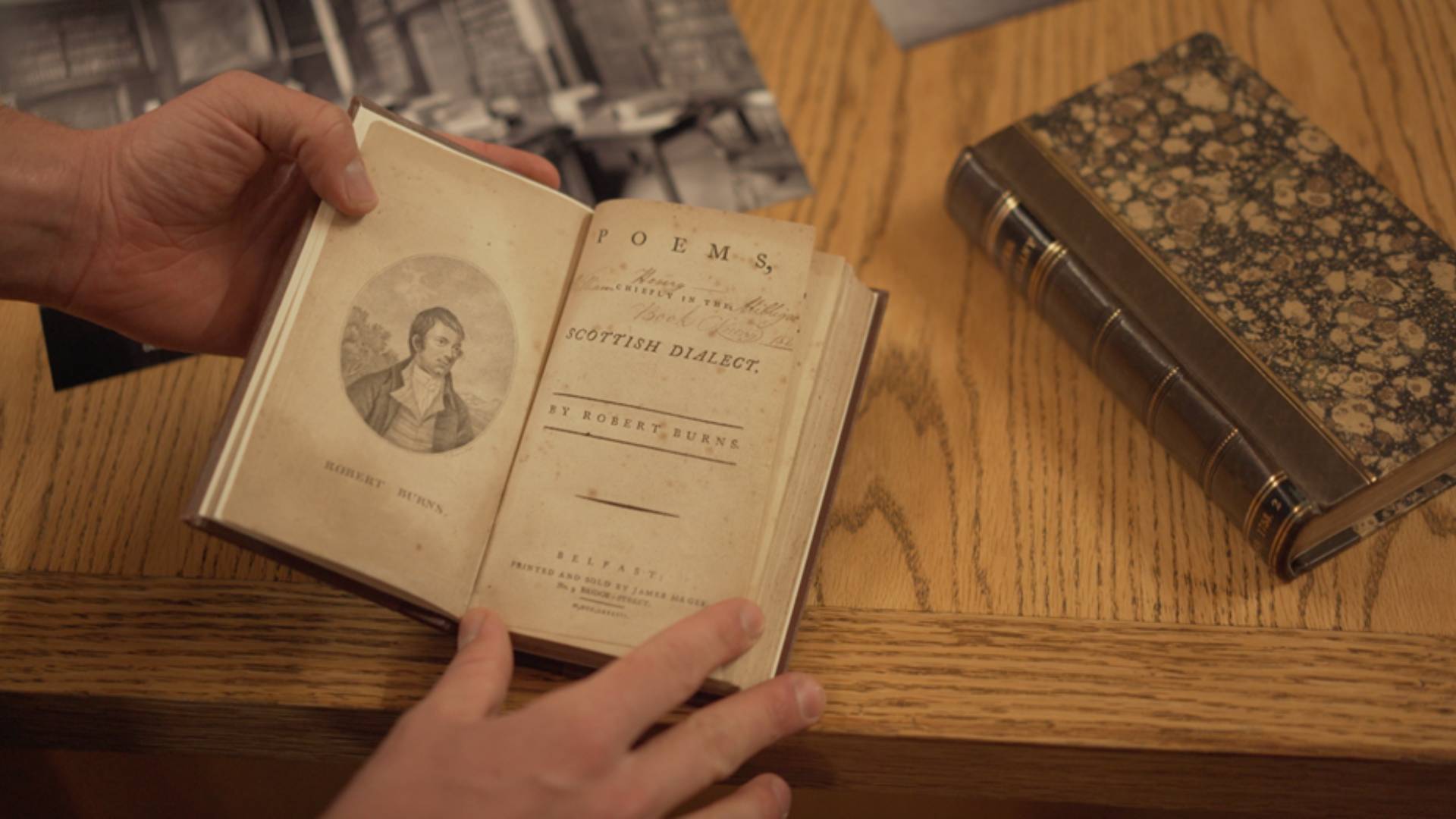
The Gibson Collection, wi its squatter o Burns quairs, Burnsiana, an Burns material, is a testament tae the routh o historical links atween Ulster an Scotland. It minds us that Burns’s poetic leid, ‘chiefly in the Scottish dialect’, wis, an aye is, shared on baith sides o the Irish Sea. Forby, it allous us tae read intae Northren Irish culture wi a Scottish ee.
Oothrou the seventeen-hunners, Glesgae wis a hetbed o Scoto-Irish exchynge. Trade, religion, an Enlichtenment philosophy aa played a muckle pairt in thon, as kythed bi the kenspeckle Francis Hutcheson (1694-1746), Ulster-born Presbyterian an Chair o Moral Philosophy at the University o Glesgae, whase lecturs brocht croods o gleg Irish an Scots fowks thegither. Sic backgroon is key fur tae unnerstaun the fain walcome o Burns’s quair in Ulster. In 1787, the Embra edition o Burns’s poems wis piratit bi James Magee, a sleekit Belfast prenter wha selt aa his copies in jist ower a week. Thon wis the verra first furthsettin o Burns’s poems ootwi Scotland. A copy o it can be seen at the Linen Haa the day: it is aye the brawest ferlie o the Gibson collection an a muckle staple o Ulster Scots culture.

Whit is nou kent as Burns’s ‘Belfast Edition’ gaed on tae rouse the wits o mony Ulster bards o the time, fae Samuel Thomson tae James Orr. Like Burns, sic poets shared a Presbyterian upbringin, threapin agin hierarchy an aristocracy in baith Kirk an state. This gart the maist o thaim tak radical stances, scrievin verse fur The Northern Star, the paper o the Society o Unitit Irishmen that stood fur a free-staunin, secular, republican Ireland. It is wirth takkin tent o The Northern Star, whilk re-prentit Burns’s faur-kent tune, ‘’A Man’s a Man for a’ that’ in October 1795 an whase hantle o funders includit William Magee, the son o Burns’s first Belfast prenter, James Magee.

Sic a radical walcome fur Burns in Ulster didnae bide on, hooivver. Efter the Unitit Irishmen’s uprisin schemes were malafoustert, in 1798, a cannier, mair leal, mair British approach tae Burns began tae tak root. The Gibson Collection is a skyrie gowdmine o Burnsiana, wi mony buiks, pamphlets an records scrievit anent Burns in the nineteenth-century. It maun be notit wi interest that a guid wheen o thae buiks are religious taks on Burns, sic as Rev. Robert Blackley Drummond’s The Religion of Robert Burns and M. Scott’s Burns and his Religious Belief, baith fae 1859, Burns’s Centenary year. Siclike buiks lat ken the aye-growin protestant strive o the time, ettlin tae turn Burns intae a douce, pious chiel, awa fae conceits o radicalism or illicit hochmagandie. This concern wis aye shared by Ulster Presbyterians, eidently willin tae mak Burns a mair siccar pairt o their British identity.

As a stieve unionist, memmer o the Belfast Scottish Unionist Club an vice-chair o the Duncairn Unionist Association, Andrew Gibson, a man wha had grown up on Ayrshire’s Covenanted grund, wad hae read Burns in ane alike way. In mony ways, his Burns collection can be seen as a muckle ettle tae forder Ulster’s Scottish, protestant, an British roots forby. An yet, in sae daein, the collection waukent interest in its maist skyre gem: the ‘Belfast Edition’ o Burns, prentit at a time whan the Scottish creed o Ulster’s Presbyterian poets set thaim on the rebellious wynds tae Irish Unity raither nor the leal causey o ‘King an Kintra’. In ither wurds, Gibson’s lifewark, entirely free tae access at Belfast’s Linen Haa, is aye a traisur trove fur onybody wishin tae faddom the fickle howes o Ulster-Scots identity.


The Linen Hall (Belfast Library And Society For Promoting Knowledge) is registered with the Charity Commission for Northern Ireland NIC 104 564.